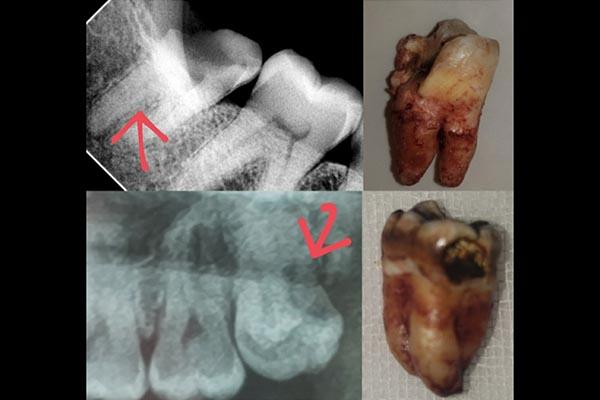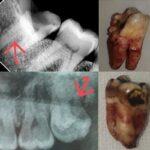Wisdom teeth, also known as third molars, are the last set of molars to develop in most people. They typically emerge in the late teens or early twenties and can cause a variety of problems due to their placement at the back of the mouth.
For many people, the jawbone is not large enough to accommodate the growth of these teeth, causing crowding and misalignment of other teeth. This can lead to discomfort, pain, and an increased risk of gum disease and decay.
In these cases, a dentist or oral surgeon may recommend the removal of the wisdom teeth. This procedure is a common one, and recovery is typically quick and uneventful. Pain, swelling, and stiffness are common after the removal of wisdom teeth, but these symptoms can be managed with pain medication and rest.
In some cases, wisdom teeth may develop normally and cause no problems, in which case there is no need to remove them. If you have concerns about your wisdom teeth, it is best to consult with a dentist or oral surgeon for a professional evaluation and recommendations.
- When is wisdom teeth removed?What happens if wisdom teeth is not removed?
Wisdom teeth are usually removed when they are causing problems or are likely to cause problems in the future.If wisdom teeth are not removed, they can cause a variety of problems. Common indications for wisdom teeth removal and some of the potential consequences when wisdom teeth are not removed include:
- Crowding: When the wisdom teeth emerge, they can push against the other teeth in the mouth and cause crowding. This can lead to misalignment and discomfort.
- Impaction: Wisdom teeth may become impacted, meaning they do not fully emerge from the gum line. This can cause pain, swelling, and infection.
- Decay and gum disease: Wisdom teeth are located at the back of the mouth and can be difficult to clean properly. This can increase the risk of decay and gum disease.
- Cysts: In some cases, fluid-filled cysts may develop around the wisdom teeth, causing damage to the surrounding teeth, jawbone, and nerves.
- Tooth loss: If left untreated, the problems associated with wisdom teeth can lead to the loss of other teeth.
The best time to remove wisdom teeth is typically when they are fully developed, but before they have caused significant problems. Your dentist or oral surgeon will be able to advise you on the appropriate time to remove your wisdom teeth based on your individual circumstances.It’s important to monitor the development of your wisdom teeth and seek treatment if necessary. Regular dental check-ups can help identify any potential issues early on, allowing for prompt and effective treatment. If you have concerns about your wisdom teeth, it is best to consult with a dentist or oral surgeon for a professional evaluation and recommendations.
- Procedure for wisdom teeth removal
Wisdom teeth removal is a common oral surgical procedure that is usually performed by a dentist or oral surgeon. The specific steps of the procedure can vary depending on the individual case, but generally, the process involves the following steps:
- Anesthesia: Before the procedure, the patient will be given a local anesthetic to numb the area around the wisdom tooth, or a general anesthetic to put the patient to sleep.
- Incision: The oral surgeon will make an incision in the gum tissue to access the wisdom tooth.
- Bone removal: If necessary, the oral surgeon will remove some of the surrounding bone to get to the tooth.
- Tooth extraction: The wisdom tooth is then carefully extracted from the socket.
- Stitching: The incision in the gum tissue will be closed with sutures, and the area will be covered with a dressing or gauze.
- Recovery: After the procedure, the patient will be given post-operative instructions, including information on pain management, swelling, and eating and drinking.
The procedure usually takes 30 minutes to an hour, and patients can typically return to normal activities within a few days to a week. However, it’s important to follow the instructions provided by the oral surgeon to ensure proper healing and minimize the risk of complications. If you have questions or concerns about wisdom teeth removal, it is best to consult with a dentist or oral surgeon for personalized information and advice.
- Instructions to follow after wisdom teeth removal
After wisdom teeth removal, it’s important to follow your oral surgeon’s instructions carefully to ensure proper healing and minimize the risk of complications. Some of the general instructions to follow after wisdom teeth removal include:
- Pain management: Your oral surgeon may prescribe pain medication to help manage any discomfort after the procedure. Take the medication as directed and avoid drinking alcohol while taking it.
- Swelling: Swelling is normal after wisdom teeth removal, and can be managed with ice packs applied to the affected area.
- Bleeding: Some light bleeding is normal after wisdom teeth removal, and can be controlled by biting down on gauze.
- Diet: Avoid solid foods for the first 24 hours after the procedure, and then gradually progress to soft foods as tolerated. Avoid foods that are hot, hard, crunchy, or sticky for several days.
- Oral hygiene: Brush your teeth gently, but avoid the surgical area for the first few days. Rinse your mouth with salt water several times a day to promote healing.
- Activity: Avoid physical activity for the first few days after the procedure to minimize the risk of bleeding and swelling.
- Follow-up: Follow your oral surgeon’s instructions for follow-up appointments, and report any concerns or unusual symptoms promptly.
It’s important to follow these instructions carefully to ensure proper healing and minimize the risk of complications. If you have any questions or concerns, it is best to consult with your oral surgeon for personalized information and advice.
- Is wisdom teeth removal painful?
Wisdom teeth removal can be associated with some discomfort, but the amount of pain experienced can vary from person to person. The procedure is usually performed with a local anesthetic or a general anesthetic to numb the area and reduce the level of discomfort.
After the procedure, some patients may experience pain, swelling, and discomfort, which can typically be managed with over-the-counter pain medication or a prescription pain medication prescribed by the oral surgeon. Ice packs can also be applied to the affected area to reduce swelling.
It’s important to follow your oral surgeon’s instructions for pain management and follow-up care to minimize discomfort and ensure proper healing. If you have concerns about the level of discomfort associated with wisdom teeth removal, it is best to consult with your oral surgeon for personalized information and advice.













